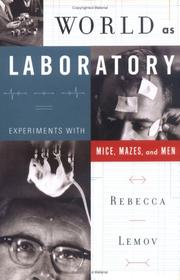| Listing 1 - 4 of 4 |
Sort by
|
Book
ISBN: 0300216645 9780300216646 9780300209525 0300209525 Year: 2015 Publisher: New Haven
Abstract | Keywords | Export | Availability | Bookmark
 Loading...
Loading...Choose an application
- Reference Manager
- EndNote
- RefWorks (Direct export to RefWorks)
An acclaimed science historian uncovers the fascinating story of a "lost" project to unlock humanity's common denominator that prefigured the emergence of Big Data Just a few years before the dawn of the digital age, Harvard psychologist Bert Kaplan set out to build the largest database of sociological information ever assembled. It was the mid-1950s, and social scientists were entranced by the human insights promised by Rorschach tests and other innovative scientific protocols. Kaplan, along with anthropologist A. I. Hallowell and a team of researchers, sought out a varied range of non-European subjects among remote and largely non-literate peoples around the globe. Recording their dreams, stories, and innermost thoughts in a vast database, Kaplan envisioned future researchers accessing the data through the cutting-edge Readex machine. Almost immediately, however, technological developments and the obsolescence of the theoretical framework rendered the project irrelevant, and eventually it was forgotten.
Psychology --- Dreams --- Sociology --- Social theory --- Social sciences --- Dreaming --- Subconsciousness --- Visions --- Sleep --- Behavioral sciences --- Mental philosophy --- Mind --- Science, Mental --- Human biology --- Philosophy --- Soul --- Mental health --- Data processing --- History --- Research --- Kaplan, Bert,

ISBN: 0809074648 9780809074648 Year: 2005 Publisher: New York : Hill and Wang,
Abstract | Keywords | Export | Availability | Bookmark
 Loading...
Loading...Choose an application
- Reference Manager
- EndNote
- RefWorks (Direct export to RefWorks)
Behavior modification --- Psychoanalysis. --- Social engineering --- Study and teaching --- History
Book

ISBN: 9780226324159 9780226046631 9780226046778 022604677X 022604663X Year: 2013 Publisher: Chicago University of Chicago Press
Abstract | Keywords | Export | Availability | Bookmark
 Loading...
Loading...Choose an application
- Reference Manager
- EndNote
- RefWorks (Direct export to RefWorks)
Polemology --- Cold War. --- World politics --- Cold War --- Reason --- Rationalism --- Game theory --- Philosophy. --- Political aspects.
Book
ISBN: 9782930601168 2930601167 Year: 2015 Volume: 14 Publisher: Bruxelles: Zones sensibles,
Abstract | Keywords | Export | Availability | Bookmark
 Loading...
Loading...Choose an application
- Reference Manager
- EndNote
- RefWorks (Direct export to RefWorks)
Aux Etats-Unis, au plus fort de la Guerre froide, un nouveau projet visant à redéfinir la rationalité suscita l'intérêt d'intellectuels brillants, de politiciens influents, de fondations fortunées et des hauts cercles de l'armée. En s'appuyant sur les sciences humaines (psychologie, sociologie, sciences politiques ou économiques), ces différents acteurs s'engagèrent dans une campagne intellectuelle visant à comprendre ce que la «rationalité» devrait être et de quelle manière elle pourrait être investie. Quand la raison faillit perdre l'esprit remet en scène ceux qui jouèrent un rôle clef dans ce programme (Herbert Simon, Oskar Morgenstern, Herman Kahn, Anatol Rapoport, Thomas Schelling et bien d'autres encore), ainsi que les institutions qui les appuyèrent - la RAND Corporation, le Center for Advanced Study in the Behavioral Sciences, la Cowles Commission for Research and Economics, le Council on Foreign Relations. Ces décideurs exploitèrent cette vision de la rationalité (optimisation, rationalité algorithmique et mécanique) dans leur quête de compréhension de phénomènes aussi divers que l'économie des transactions, l'évolution biologique, les élections politiques, les relations internationales ou la stratégie militaire. En plongeant le lecteur dans le climat intellectuel de la Guerre froide, cet ouvrage expose ce qu'être «rationnel» signifiait dans un monde au bord du précipice nucléaire.
Cold War --- World politics --- Reason --- Rationalism --- Game theory --- Philosophy --- Political aspects --- World politics - 1945-1989 --- Cold War - Philosophy --- Reason - Political aspects --- Rationalism - Political aspects --- Game theory - Political aspects --- Guerre froide --- Rationalité --- Sciences humaines --- Recherche --- Humanities --- Philosophy. --- Political aspects. --- Research
| Listing 1 - 4 of 4 |
Sort by
|

 Search
Search Feedback
Feedback About UniCat
About UniCat  Help
Help News
News